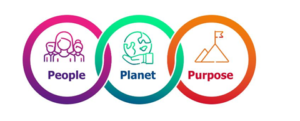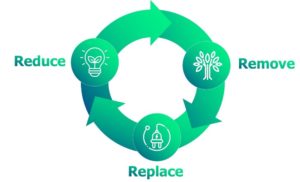CASE STUDY: Sopra Steria

Reaching Net Zero
At Sopra Steria we believe that our services only truly make a difference if they work for people, the planet and if they serve a greater purpose. Social Value is at the heart of everything we do in Sopra Steria.

In 2023, Sopra Steria’s near and long-term targets for reaching net zero were approved by the Science Based Targets initiative (SBTi). The targets were validated against the criteria of the SBTi Net-Zero Standard which has commonly become adopted by organisations as best practice for setting net zero targets. Sopra Steria is taking steps towards reaching its target of being net zero by 2040 with a three-stage approach. We call it the “three R’s” of tackling climate change:
1. Reduce consumption of energy, particularly energy from fossil fuels
2. Replace fossil fuels as a source of energy with renewable sources
3. Remove unavoidable emissions from the atmosphere.

Reduce
As part of our commitment to shaping our world for the better we have committed to reducing our energy consumption. The cost of living and energy crisis provided a stark realisation that transitioning to net zero creates opportunities for both people and the planet. Our Energy Savings Campaign invited our employees to share tips on how to keep their energy bills down and reduce their emissions at home. This helped us to create behaviour changes which benefit us all.
We’ve established an Energy Efficiency Working Group made up of key internal functions that influence energy usage including the Environment, Property & Facilities and I.T. teams. to look at energy efficiency initiatives and investment in measures to reduce our greenhouse gas emissions. The group is exploring options across all sites to develop a holistic programme that helps to reduce energy emissions and limit the impact of rising prices.
The group have helped us to start reducing our energy consumption including:
– 52% of UK properties have now had older lighting replaced with energy and cost-efficient LED lights!
– Collaborating with a building maintenance contractor we’ve installed electricity sensors at two sites that consume around 50% of the electricity consumed across our UK offices. This way we can monitor in real-time where the usage hot spots are
– In 2022 we closed some of our offices over the Christmas period to minimise the environmental footprint of using energy for heating, lighting and power at a time of minimal usage.
– The right-sizing of our property estate has also been an effective way of reducing energy usage. The introduction of flexible ways of working means heating and lighting a big space for few people is much less efficient. Therefore, properties were consolidated to ensure building energy usage was proportionate to office utilisation.
This holistic energy reduction programme enabled Sopra Steria to reduce building energy usage by 49% in 2022 versus 2015.
However, there’s so much more to reducing energy consumption than just what we use in our offices. As an I.T. company we accept our responsibility in managing the growth in demand for digital services in a sustainable way.
1. Storing data, emails and files is energy intensive so we ran a “Digital Detox” campaign to encourage employees to reduce the storage of emails and files.
2. Manufacturing a laptop requires around 1MWh of energy, however if used for eight hours a day for 200 days (around six and a half months) each year, it will only consume about 80kWh of electricity. It makes sense to continue to use a laptop for as long as possible and then recycle the materials afterwards. In 2022, Sopra Steria reused or recycled5% of its electronic waste.
3. Our demand for printing paper drives deforestation as trees are normally felled during production. Sopra Steria goes beyond double-sided printing by using closed-loop paper made from recycled fibre, thereby avoiding the emissions associated with the manufacture of paper from virgin fibre. This process uses 83% less water, 72% less energy, and 53% less CO2 based on 500 sheets of A4 paper.
4. Value Chain Emissions (Scope 3) account for the greatest proportion of an organisations carbon footprint. Sopra Steria is working with its supply chain to ensure that 90% of their suppliers- accounting for 70% of supply chain emissions, have set GHG emission reduction targets by 2025.
5. In the UK we are introducing a Sustainable Procurement programme which implements a new calculation for Scope 3 Category 1 emissions related to purchased goods and services. This was developed to overcome the challenges created by the traditional calculation of emissions using supplier spending data. Our new methodology will:
a. improve the accuracy of reported data
b. provide greater opportunities for engagement and collaboration with suppliers
c. allow the positive environmental impacts from innovation, across our value chain, to be reflected in a trajectory of declining emissions
Sopra Steria will test this new approach with a select group of UK suppliers by the end of 2023 before extending this out across the rest of the supply chain.
Replace
Switching from fossil fuels to renewable electricity is one way of reducing emissions. 100% of the electricity that Sopra Steria consumes in the UK comes from renewable sources. This has given Sopra Steria the ability to reduce its Scope 2 market-based emissions to zero.
Sopra Steria makes cloud its default platform for solutions as a cloud-based data centre solution uses as little as a tenth as many resources – computing power and energy – as a dedicated one.
To ensure a reduction in emissions from the transportation sector, the new Sopra Steria car allowance scheme, launched in 2022, has eliminated petrol and diesel vehicles from selection. Now employees can only drive battery-electric or plug-in hybrid electric vehicle as part of their employee benefits.
Remove
It’s difficult to completely avoid emissions from all sources – particularly those outside your immediate control, such as supply chain and employee commuting. To manage this, Sopra Steria as part of its commitment to the SBTi Net-Zero Standard will have a maximum 10% reliance on purchasing carbon removal offsets to funds projects – typically afforestation – that remove carbon dioxide from the atmosphere, to reduce our emissions by 90% by 2040.
At Sopra Steria we recognise the importance of collaboration in getting us to net zero. Technology solutions are developing all the time, and we are always open to partnering with other organisation’s around how we can accelerate our progress to net zero and indeed that of our clients.
